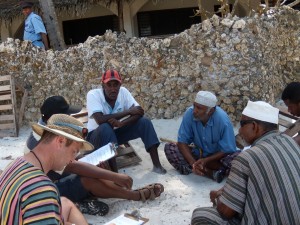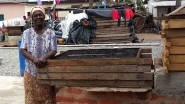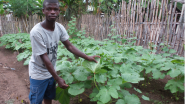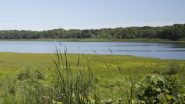The Estuarine and Mangrove Ecosystem-Based Shellfisheries of West Africa Spotlighting Women-Led Fisheries Livelihoods
Chuku, E. O., Adotey, J., Effah, E., Abrokwah, S., Adade, R., Okyere, I., Aheto D. W., Kent, K., Crawford, B. 1 October 2021
This report presents findings from a participatory assessment of the shellfisheries conducted under the Women Shellfishers and Food Security Project funded by the United States Agency for International Development (USAID). The assessment was conducted in 11 coastal West African countries: Senegal, The Gambia, Guinea Bissau, Guinea, Sierra Leone, Liberia, Côte d’Ivoire, Ghana, Togo, Benin, and Nigeria. The findings are presented in two main sections. Section 1 describes the purpose and scope of the assessment and Section 2 presents the regional overview of shellfisheries in West Africa. The report covers key data gaps identified in an initial literature review conducted prior to this study including estimated mangrove cover, presence of women shellfishers, and number of women shellfishers. Detailed country reports were also produced as part of this activity and are compiled in separate documents. This report brings to the fore, for the first time, a regional perspective of estuarine and mangrove ecosystem-based shellfisheries, a small-scale fisheries sector that has long been overlooked. All 11 sub-Saharan West African countries assessed were found to have active shellfisheries interspersed along their combined 4,472 km coastline. For each country, there were at least four major sites practicing shellfish harvesting and trade. This indicates the potential for future efforts for scale-up through direct investments, research, and capacity building, as well as the development of value chains within this industry. The description of shellfisheries reveals the intensity of shellfisheries livelihoods across the West African coast. It documents that the shellfisheries sector presents an opportunity to scale up the enhancement of livelihood opportunities, especially for women, and an opportunity to scale and strengthen the contribution of shellfisheries to food and nutritional security and sustainable natural resource management across the sub-Region.
Media Awareness and Advocacy On Clat Policies and Laws: – Journalist Orientation Workshops
Johnson, K.B.R., Efua.,N. Yamoah, K.K. 1 August 2018
Human trafficking is a worldwide epidemic that deprives women, men and children of their basic rights each day. It has been recognized as one of the fastest growing crimes in the world that profits from the exploitation and victimization of human beings and undermines national economies and human safety. Virtually all countries are affected (source, transit, destination or a combination) thereof and Ghana is no exception. Specifically, on Ghana, the challenge (and crime) is steeped deep in poverty and ignorance with the powerful and greedy exploiting the vulnerabilities of the poor and the ignorant.
Population, Health, and Environment (PHE) Approaches
Coastal Resources Center 1 January 2010
The BALANCED project seeks to encourage the adoption and promotion of PHE approaches among champions and practioners in areas of high biodiversity threatened by population pressures.
*Through this semi-annual Newsletter, we will highlight insights and ideas from ongoing field experience on why PHE is important, delve into what PHE
approaches are, and examine best practices in applying PHE concepts on the ground.
The primary target audience for the BALANCED Newsletter is people who are already aware of PHE approaches, who might be interested in incorporating them into their own projects as well as for PHE Champions utilizing PHE messages and methods.
Population, Health and Environment (PHE) Approaches and Links to Climate Change Mitigation and Adaptation
Coastal Resources Center 1 January 2010
The Fall 2010 issue of the BALANCED Newsletter examines the links between PHE approaches and climate change mitigation and adaptation, because of the increasing global and national attention on the growing threat of greenhouse gases in the atmosphere, the impacts of climate change on communities, and interventions to address these impacts.
This second issue contains five articles on:
*The broad links between climate change and opportunities for PHE projects and practitioners to address climate change in their work and vice versa—i.e., for PHE approaches to inform climate change adaptation approaches;
*An evolving institutional approach to addressing PHE and climate change adaptation at the World Wildlife Fund (WWF);
*A vulnerability assessment in Tanzania and potential links between a community-based coastal adaptation initiative and PHE activities;
*A synthesis of a Batelle Memorial Institute commissioned report by CDM International Inc. and USAID describing the state of the science on glacial melt in the Asia Near East region and how integrated approaches can help reduce climate change impacts in the region; and
*An overview of the Ethio-Wetlands and Natural Resources Association (EWNRA) PHE Project in Ethiopia which is helping to meet climate change objectives.






